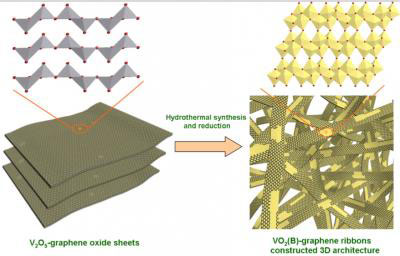 Hybrid ribbons of vanadium oxide and graphene may accelerate the development of high-power lithium-ion batteries suitable for electric cars and other demanding applications.
Hybrid ribbons of vanadium oxide and graphene may accelerate the development of high-power lithium-ion batteries suitable for electric cars and other demanding applications.
Mar 25th, 2013
Read more
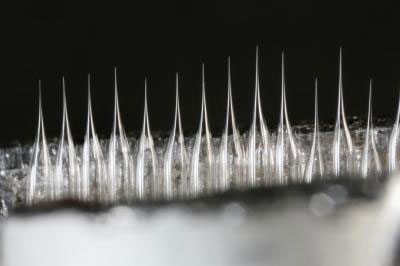 Researchers are using the electrical properties of a scanning electron microscope to change the size of glass capillary tubes -- Their method has already been patented as it could pave the way to many novel applications.
Researchers are using the electrical properties of a scanning electron microscope to change the size of glass capillary tubes -- Their method has already been patented as it could pave the way to many novel applications.
Mar 25th, 2013
Read more
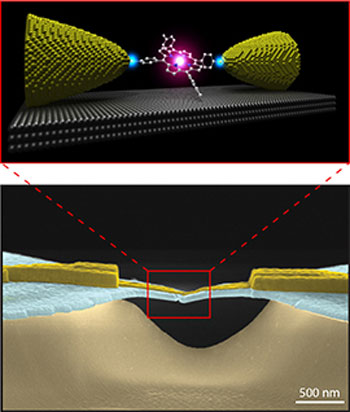 Electron transport through a single molecule offers a highly promising new technology for the production of electronic chips. However it is difficult to make a good conducting connection between the molecule and the metal contacts. Researchers have discovered an effect that plays a major role in this: the so-called 'image-charges' in the metal contacts strongly influence the electron transport through the molecule.
Electron transport through a single molecule offers a highly promising new technology for the production of electronic chips. However it is difficult to make a good conducting connection between the molecule and the metal contacts. Researchers have discovered an effect that plays a major role in this: the so-called 'image-charges' in the metal contacts strongly influence the electron transport through the molecule.
Mar 25th, 2013
Read more
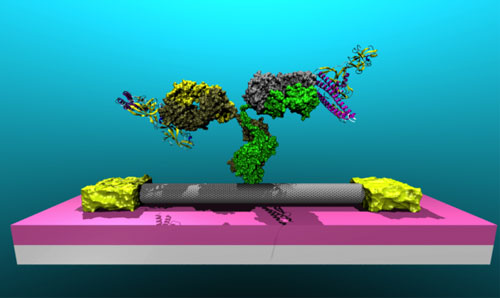 Existing tests assess the presence of antibodies against bacterial proteins, which take weeks to form after the initial infection and persist after the infection is gone. Now, a nanotechnology-inspired technique developed by researchers at the University of Pennsylvania may lead to diagnostics that can detect the organism itself.
Existing tests assess the presence of antibodies against bacterial proteins, which take weeks to form after the initial infection and persist after the infection is gone. Now, a nanotechnology-inspired technique developed by researchers at the University of Pennsylvania may lead to diagnostics that can detect the organism itself.
Mar 25th, 2013
Read more
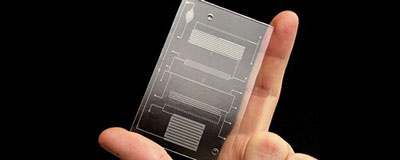 An international consortium spearheaded by the Fraunhofer Institute for Production Technology IPT in Aachen, Germany, has come together with the aim of ensuring the possibility to manufacture these systems cost-effectively in the future.
An international consortium spearheaded by the Fraunhofer Institute for Production Technology IPT in Aachen, Germany, has come together with the aim of ensuring the possibility to manufacture these systems cost-effectively in the future.
Mar 25th, 2013
Read more
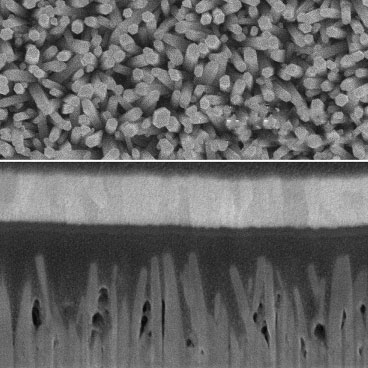 MIT researchers improve efficiency of quantum-dot photovoltaic system by adding a forest of nanowires.
MIT researchers improve efficiency of quantum-dot photovoltaic system by adding a forest of nanowires.
Mar 25th, 2013
Read more
Scientists at the Department of Physics of the University of Oulu have teamed up with scientists in France, Russia and Japan to propose a new experimental method for researching positively charged ions.
Mar 25th, 2013
Read more
 A team of researchers at Wake Forest University will help to make these flexible devices a reality by studying the relation between the physical structure and electronic properties of organic semiconductor crystals.
A team of researchers at Wake Forest University will help to make these flexible devices a reality by studying the relation between the physical structure and electronic properties of organic semiconductor crystals.
Mar 25th, 2013
Read more
An international team of plasma physicists has used one of the world's most powerful lasers to create highly unusual plasma composed of hollow atoms.
Mar 25th, 2013
Read more
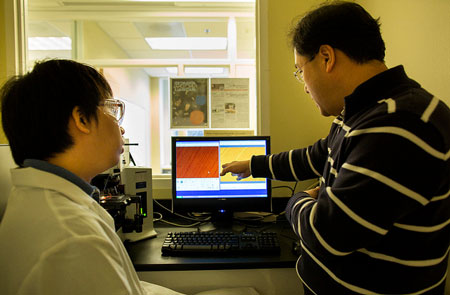 Semiconducting polymers are an unruly bunch, but University of Michigan engineers have developed a new method for getting them in line that could pave the way for cheaper, greener, 'paint-on' plastic electronics.
Semiconducting polymers are an unruly bunch, but University of Michigan engineers have developed a new method for getting them in line that could pave the way for cheaper, greener, 'paint-on' plastic electronics.
Mar 24th, 2013
Read more
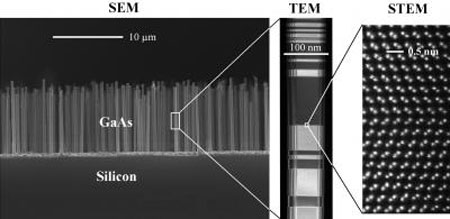 Scientists from the Nano-Science Center at the Niels Bohr Institut, Denmark and the Ecole Polytechnique F�d�rale de Lausanne, Switzerland, have shown that a single nanowire can concentrate the sunlight up to 15 times of the normal sun light intensity. The results are surprising and the potential for developing a new type of highly efficient solar cells is great.
Scientists from the Nano-Science Center at the Niels Bohr Institut, Denmark and the Ecole Polytechnique F�d�rale de Lausanne, Switzerland, have shown that a single nanowire can concentrate the sunlight up to 15 times of the normal sun light intensity. The results are surprising and the potential for developing a new type of highly efficient solar cells is great.
Mar 24th, 2013
Read more
A new study of genetically modified immune cells by scientists from UCLA and the California Institute of Technology could help improve a promising treatment for melanoma, an often fatal form of skin cancer.
Mar 22nd, 2013
Read more
Cancer drug designed with fertility in mind using fast new test to predict toxicity.
Mar 22nd, 2013
Read more
The first ever Zimbabwe International Nanotechnology Centre was launched in Harare early this week.
Mar 22nd, 2013
Read more
Researchers have established a first step on the road to new applications for organic magnets: Their controlled deposition in a thin film.
Mar 22nd, 2013
Read more
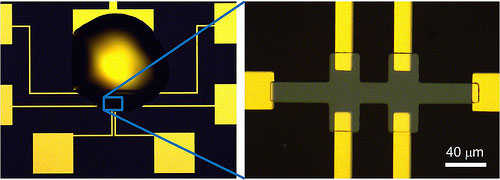 IBM today announced a materials science breakthrough at the atomic level that could pave the way for a new class of non-volatile memory and logic chips that would use less power than today's silicon based devices. Rather than using conventional electrical means that operate today's semiconducting devices, IBM's scientists discovered a new way to operate chips using tiny ionic currents, which are streams of charged atoms that could mimic the event-driven way in which the human brain operates.
IBM today announced a materials science breakthrough at the atomic level that could pave the way for a new class of non-volatile memory and logic chips that would use less power than today's silicon based devices. Rather than using conventional electrical means that operate today's semiconducting devices, IBM's scientists discovered a new way to operate chips using tiny ionic currents, which are streams of charged atoms that could mimic the event-driven way in which the human brain operates.
Mar 22nd, 2013
Read more
 Hybrid ribbons of vanadium oxide and graphene may accelerate the development of high-power lithium-ion batteries suitable for electric cars and other demanding applications.
Hybrid ribbons of vanadium oxide and graphene may accelerate the development of high-power lithium-ion batteries suitable for electric cars and other demanding applications. 









 Subscribe to our Nanotechnology News feed
Subscribe to our Nanotechnology News feed